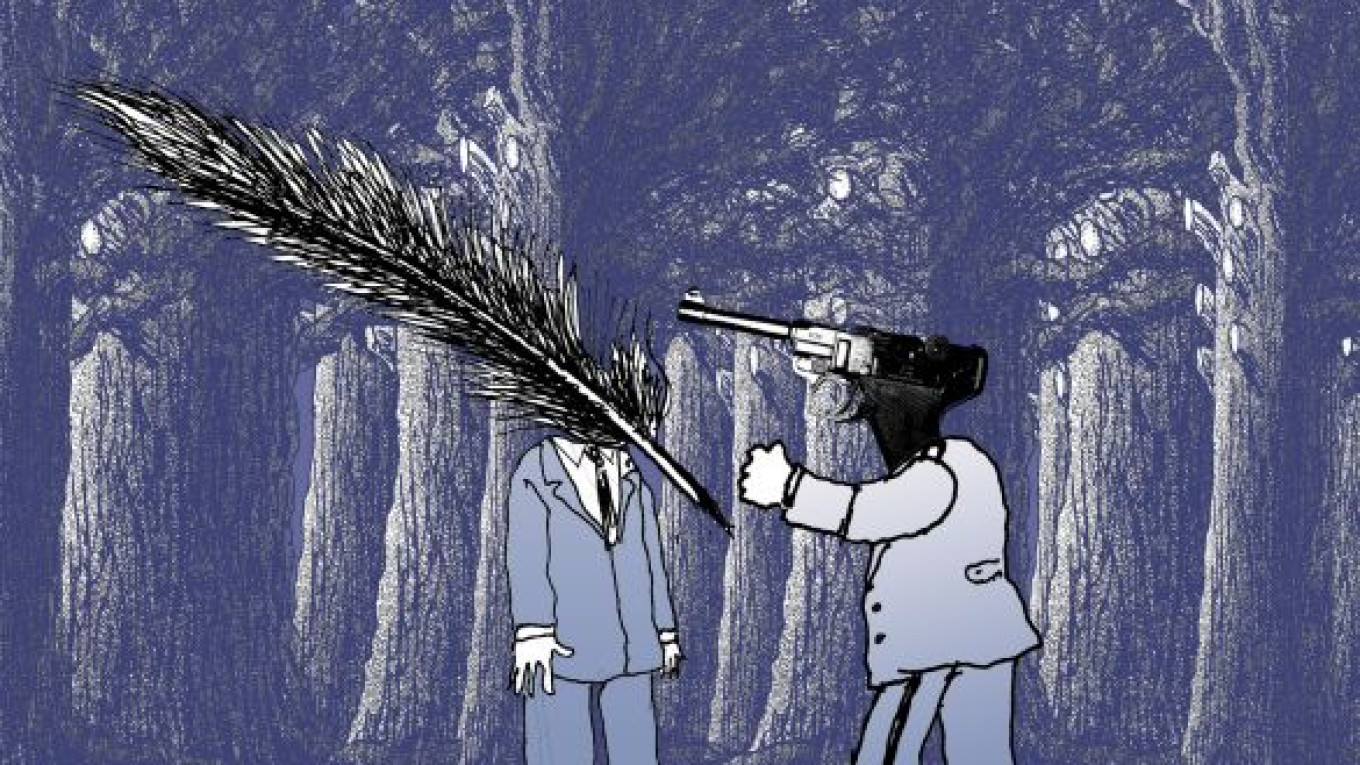Imagine if the FBI director, livid at a Washington Post journalist over the publication of an incriminating investigative article against the agency, invites him to a forest and threatens to rip the journalist's head off if he doesn't stop publishing these articles.
This is what happened when Investigative Committee head Alexander Bastrykin threatened Novaya Gazeta deputy editor-in-chief Sergei Sokolov for writing an article suggesting that his agency had covered up crimes committed by the Kushchevskaya gang, which murdered a dozen people, including children, in 2011.
The incident came to light when Novaya Gazeta editor-in-chief Dmitry Muratov published an open letter explaining Bastrykin's abuse of power. The Investigative Committee did not respond that day. But the next day, Bastrykin gave an interview to Izvestia in which he branded the accusations as "the ravings of a warped mind" and expressed no interest in reconciliation. Two hours later, a meeting was convened with Novaya Gazeta journalists and the directors of other media outlets. At that meeting, Bastrykin and Muratov shook hands and declared the incident closed.
It is clear that the last-minute reconciliation was the result of President Vladimir Putin's intervention in the affair. The last thing Putin needs right now is a major scandal of this type, one that would only inflame the already-restless opposition movement.
Some journalists welcomed the resolution of the conflict, saying Muratov had received some security guarantees from the Investigative Committee. Foremost among them was protection for journalists working in the North Caucasus, where there have been widespread threats and violence against investigative journalists since 2000.
At the same time, however, other journalists sharply condemned the reconciliation, arguing that it ignored the fact that Bastrykin had broken the law by making physical threats against a reporter. They also said such an arrangement compelled Novaya Gazeta to take a softer stance against other actions of the Investigative Committee, such as the outrageous searches of opposition leaders' homes.
Bastrykin's meeting with critical, liberal journalists was highly unusual for a top government official. Usually, officials just ignore them, considering them to be little more than pesky insects that buzz around their ears until they are swatted.
There was some logic behind Muratov's decision to make amends with Bastrykin. In view of the circumstances in Russia, the mass media are often forced to play by the unwritten rules of government agencies, including the need to make secret deals with them and to obtain unofficial approval for the tone and subject matter of their publications. In this way, Novaya Gazeta had no other choice but to cooperate closely with the Investigative Committee in covering high-profile murders — even the murders of its own reporters, such as Anna Politkovskaya.
Had the newspaper not established these informal ties with the Investigative Committee, had it pursued a policy of persistent investigative reporting of government abuse, the investigations into those murders would have probably been dropped long ago without the Investigative Committee suffering any negative consequences.
Unfortunately, the Russian media are far more dependent on the ruling elite than the media in most Western countries, and this applies to the liberal media that is most vocal in its criticism of the Kremlin. Right before the forest incident occurred, Sokolov was flown to a meeting in Nalchik on Bastrykin's own government airplane to attend a meeting, and Sokolov was initially given a seat among the panel of speakers.
Thus, Russian journalists are often forced to play by the Kremlin's rules to one degree or another. As long as this is the case, it is difficult to speak of the country's media — even its most "independent" — as a "fourth estate" in the Western sense.
This scandal should also be viewed in the context of the intense rivalry between the Investigative Committee and the Prosecutor General's Office. State Duma Deputy Alexander Khinshtein, a former investigative journalist and supporter of the prosecutor's office in its long-standing feud with Bastrykin, also played a role in the affair. The day before the Novaya Gazeta piece was published, Khinshtein was reportedly ready to publish incriminating evidence that would have raised the feud between the two competing agencies to a dangerous level. This may have been the decisive factor that prompted Putin to intervene. He dislikes anything that disturbs the divide-and-conquer system he has created for controlling the interclan struggles among the ruling elite.
To outsiders, it is difficult to determine in cases like Novaya Gazeta vs. Bastrykin whether this is a battle for media freedom or simply the machinations of Byzantine backroom intrigues. It may be tempting for journalists to criticize Muratov for shaking hands with his archenemy and accepting his apology, but anyone would have probably done exactly the same in a similar situation.
Georgy Bovt is a political analyst.
A Message from The Moscow Times:
Dear readers,
We are facing unprecedented challenges. Russia's Prosecutor General's Office has designated The Moscow Times as an "undesirable" organization, criminalizing our work and putting our staff at risk of prosecution. This follows our earlier unjust labeling as a "foreign agent."
These actions are direct attempts to silence independent journalism in Russia. The authorities claim our work "discredits the decisions of the Russian leadership." We see things differently: we strive to provide accurate, unbiased reporting on Russia.
We, the journalists of The Moscow Times, refuse to be silenced. But to continue our work, we need your help.
Your support, no matter how small, makes a world of difference. If you can, please support us monthly starting from just $2. It's quick to set up, and every contribution makes a significant impact.
By supporting The Moscow Times, you're defending open, independent journalism in the face of repression. Thank you for standing with us.
Remind me later.


